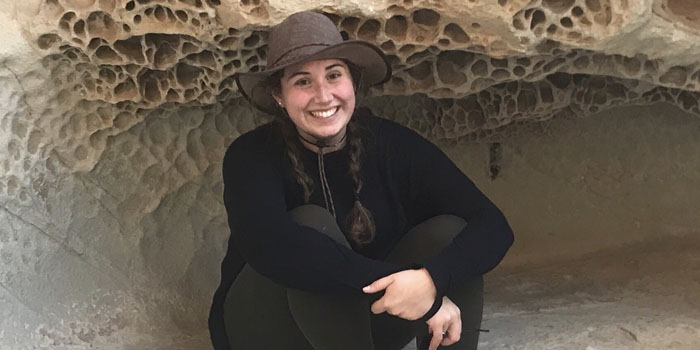
Meet Sophie Alpert
Read the full text of Sophie's interview below to learn more about her experiences.
About Sophie's Role
What were your duties as an Explorer-in-Training?
I joined the Explorer-in-Training program as an offshore mapping intern on the Okeanos Explorer's 2018 Mapping Deepwater Areas off the Southeast U.S. in Support of the Extended Continental Shelf Project. My duties onboard included cleaning and editing multibeam and sub-bottom raw data that the ship had collected. We processed this data using various softwares includmg Qimera, Fledermaus, ArcMap, and SEGyJp2. With this data I was able to create usable surfaces for scientific analysis.
Which school are you attending, or did you recently graduate from?
I received my B.S. in Geology and Environmental Geosciences with a concentration in marine and coastal geology from the College of Charleston, SC in May 2018.
Where was your work experience located? If you were working at sea, what were your impressions of living and working on a ship?
I was located on the NOAA Ship Okeanos Explorer for an exploratory mapping expedition from Davisville, RI to San Juan, PR. For most of the mapping portions of the trip we were located in areas east of the Blake Plateau and northeast of the Bahamas.
I think I had the best possible experience I could have hoped for living and working on a ship. From the moment I arrived I was welcomed into a group of incredible people on the science team and soon became friends with the ship's crew as well. Even though I was new and somewhat inexperienced, everyone was very patient with me as they helped me learn and understand my duties on board. My watch lead, as well as the entire science team, was always excited to answer any questions I had. The crew was also excited to tell me about their duties and have the interns come up to the bridge to see what their jobs consisted of.
I was surprised by how quickly and easily I acclimated to life on a ship. The staterooms were comfy and roomy and I was lucky enough to share a room with one of my best friends from college.
What sparked your initial interest in ocean sciences?
When I first started college I was unsure of what I wanted to major in but decided to take geology as my required science class. As a sophomore, I realized I really wasn't enjoying the major I had eventually decided on and wanted to experience another geology course since I enjoyed it so much the first time. The class I signed up for was Intro to Coastal and Marine Geology. On the first day of class, I talked to the professor, Dr. Leslie Sautter, and told her about my confusion about what I wanted to major in. She looked me in the eyes and told me she knew that by the end of this course she would convert me to a Geology major, and she was right! Soon after, I took her marine geology class and was convinced that this was for me. I then joined the BEnthic Acoustic Mapping & Survey program (BEAMS) that Dr. Sautter offered.
I have always had a fascination with the ocean and the animals that lived within it. I was always in the water so I was frequently referred to as a mermaid by my friends and family, so it was like fate that I happened to find this program at the College of Charleston.
What was the most personally rewarding part of your experience?
The most rewarding part of the Explorer-in-Training program was the confidence I was able to gain. As this was my first offshore experience, I didn't have a lot of confidence about my ability to do well in the ocean exploration field. Once the expedition was complete, I left feeling like I had learned a ton and gained a great amount of experience to help me progress in this field.
What is the most unexpected thing you have learned?
I don't get seasick!
How do you see this experience fitting in with your future career plans?
This experience definitely confirmed that the hydrographic and seafloor mapping field is what I want to study for the rest of my life. My supervisors gave me a really good idea of what the offshore operations of exploratory mapping expeditions are like and what ship-life is really like. I know that I want to be out in the field as much as possible after participating in the Explorer-in-Training program.
I fully believe this internship opportunity helped me get into my current position as a Hydrographic Data Technician with ERT Inc. at the Atlantic Hydrographic Branch of NOAA in Norfolk, VA and I will forever be grateful.